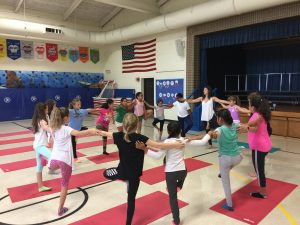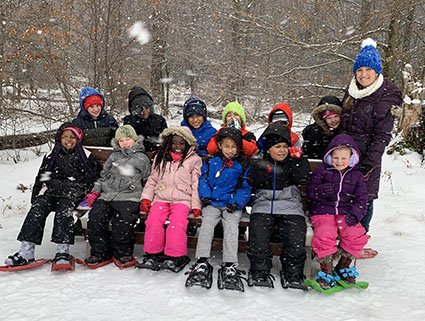EnergizEd
Only one in three kids gets physical activity each day, yet most kids spend an average of seven hours on screens daily. We make sure kids get the recommended sixty minutes of physical activity through PE, play, and more.
Movement and activity—including imaginative play, classroom brain breaks, recess, sports, PE, and more—is absolutely vital for kids’ well-being. Exercise boosts mental health and positive feelings; promotes social engagement and teamwork; and develops strength, flexibility, agility, and heart health. It also stimulates brain activity, allowing for better performance in school.
 But over 80 million people over age six in the U.S. are physically inactive. Since kids spend over 1,200 hours a year in school, schools should be focused on making sure physical activity is incorporated throughout the day. However, according to a CDC report, less than 15% of schools require the recommended weekly minutes of PE and only 48% offered physical activity clubs or activities. Additionally, only 22% of high schools had students take activity breaks and 33% of elementary schools did not offer daily recess.
But over 80 million people over age six in the U.S. are physically inactive. Since kids spend over 1,200 hours a year in school, schools should be focused on making sure physical activity is incorporated throughout the day. However, according to a CDC report, less than 15% of schools require the recommended weekly minutes of PE and only 48% offered physical activity clubs or activities. Additionally, only 22% of high schools had students take activity breaks and 33% of elementary schools did not offer daily recess.
Our EnergizEd program is a comprehensive approach to physical activity and active play that aims to build the capacity of schools to implement physical activity opportunities during the school day (outside of physical education) to ensure children receive the recommended 60 minutes of moderate-to-vigorous physical activity daily. The key components of our EnergizEd program model include:
- Culturally responsive and age-appropriate experiential learning initiatives that provide students with an opportunity to be physically active during the school day (outside of physical education) and include initiatives such as classroom physical activity breaks, active/sensory hallways and recess. Experiential learning initiatives are designed to promote “learning through reflection on doing” and to create opportunities for students to apply skills and knowledge learned within the context of their community, cultural background and own lived experiences. Learn more about what experiential learning initiatives look like in action with EnergizEd.
- Capacity-building learning sessions around comprehensive school physical activity program best practices, with a specific focus on during-school physical activity outside of physical education, family engagement and staff involvement, to ensure that schools and families provide regular access to physical activity that result in students receiving the recommended 60 minutes of moderate-to-vigorous physical activity daily.
What is AFHK doing?
EnergizEd is implemented as a part of our holistic family-school partnership model. We do this by:
- Building strong family-school partnerships that support comprehensive physical activity policies and programs at school, including PE, before- and after-school activities, classroom brain breaks, and more.
- Providing district-wide training and support to improve physical activity policies and practices, implement new initiatives and programs that build opportunities for movement into the day and promote the connection of physical activity with social-emotional health.
- Creating resources and activities that anyone can use at home or at school to promote active play, exercise, and the connection between physical activity and social-emotional health.
- Establishing comprehensive physical-activity hubs through grant funds, professional development, technical support and implementation of physical activity best practices. A comprehensive physical activity hub is a school that provides the following:
- Safe and supportive learning environments for students to explore, develop and foster behaviors that will support lifelong physical activity;
- Opportunities for students to explore and learn the mind-body connection between physical activity and social-emotional health;
- Equitable and inclusive physical activity opportunities and initiatives, representative of the unique strengths of the school community, co-created and/or co-led by families and caregivers.
How you can help:
No matter who you are, you can help make sure kids are spending more time moving and seeing the all-around health benefits of being physically active.
- Donate today to support our work providing grants, resources, and education to the school communities that need our help the most.
- Partner with us to bring physical activity to even more schools and families.
- Learn more about how you can make an impact on physical activity and play as a parent or caregiver.
- Explore our resources to see how you can get kids active in fun and creative ways.
Social Studies With a Side of Snowshoes: Walking Their Way to a Healthy Education

All it takes is pedometers and snowshoes for students at Benjamin Cosor Elementary to be able to “walk across America” during their lessons. Learn more about how they incorporate physical activity during the school day.
Read their story
Get Inspired
For more articles about how schools and parents across the country have improved kids’ health through increased physical activity and play, view our success stories.